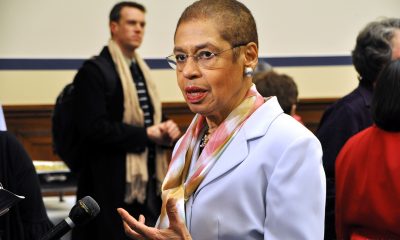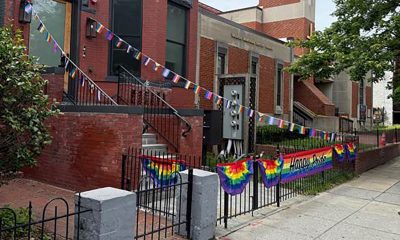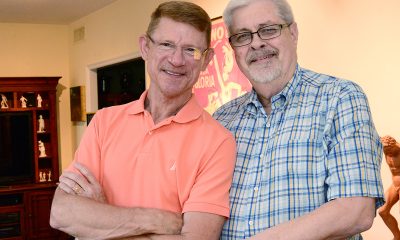Local
Couples plan courthouse visits to celebrate D.C. marriage law
Aisha Mills and her domestic partner, Danielle Moodie, plan to mark March 3, the day the District’s same-sex marriage law is scheduled to take effect, by going to the courthouse to apply for a marriage license.
Due to a mandatory three-business-day waiting period, jubilant same-sex couples — some of whom have been in relationships for more than 20 years — won’t be able to marry until March 9 at the earliest. That’s when the D.C. Superior Court’s Marriage Bureau completes the processing of their marriage licenses.
But for Mills, president of the same-sex marriage advocacy group Campaign for All D.C. Families, March 3 nevertheless represents an historic day.
“The Campaign for All D.C. Families has been working hard for some time to ensure that all residents of the District of Columbia have the opportunity to wed here, and we are excited that it will finally become a reality on March 3,” she said.
Mills’ group and other local LGBT organizations were still finalizing plans this week for a celebration linked to a possible joint appearance by same-sex couples at the courthouse on the morning of the March 3 to fill out their applications for a marriage license.
“We have at least a half-dozen couples expected at the courthouse,” said Cathy Renna of Renna Communications, an LGBT-oriented public relations firm that’s coordinating plans for celebrating the start of the marriage law.
Under court rules, a $35 license application fee plus a $10 fee for a Certificate of Marriage, must be paid by cash or money order to enable couples to submit their applications. All this takes place in Room 4485 of the Moultrie Superior Court Building at 500 Indiana Ave., N.W.
Other groups involved in the same-sex marriage equality effort in D.C. that were expected to participate in a celebration March 3 include the Gay & Lesbian Activists Alliance, D.C. for Marriage, and D.C. Clergy United for Marriage Equality.
District resident Reggie Stanley and partner Rocky Galloway “definitely” plan to be at the courthouse on the morning of March 3 to apply for a marriage license, Stanley said. But Deacon Maccubbin and longtime partner Jim Bennett, owners of the recently closed Lambda Rising Bookstore, weren’t sure this week whether to join other same-sex couples at the courthouse that morning.
“Jim and I haven’t had time to sit down and actually work out how we want to do this — whether we want to be in that first wave or whether we just want to take our time and do it in the old-fashioned way, so to speak,” Maccubbin said.
But regardless of which couples are in the first wave — or which couple is the first to wed in D.C. — Rick Rosendall of GLAA said the shared moment will be special.
“Whichever couples happen to be first in line on March 3, and whoever happens to have the first [wedding] ceremony on March 9,” he said, “it will be a deeply satisfying moment for those of us who have worked to make it possible.”
Local same-sex marriage advocates expressed a sigh of relief Feb. 19 when a Superior Court judge denied a request by their opponents for a court injunction to stop the same-sex marriage law from taking effect.
The opponents, led by Bishop Harry Jackson, pastor of Hope Christian Church in Beltsville, Md., said an injunction was needed to give them more time to organize a voter referendum that could overturn the marriage law.
Judge Brian Holeman denied the injunction request on grounds that the court lacked legal authority to block a law approved by the local D.C. government and cleared by Congress through its regular 30 legislative day review, which ends March 3.
Holeman, in a ruling delivered from the bench Feb. 19 and released in writing Monday, also said an underlying lawsuit filed by Jackson seeking to force the city to hold a referendum on the marriage issue did not appear likely to succeed on its merits. He noted the likelihood of the success of Jackson’s lawsuit was a key factor in determining whether to grant an injunction.
Jackson and his attorneys appealed Holeman’s ruling Monday to the D.C. Court of Appeals. Legal observers believe the Appeals Court is likely to uphold Holeman’s decision.
“In my view, the appeals court has no more authority to stop a law passed by the city and cleared by Congress than the lower court,” said Mark Levine, a local gay rights attorney.
Under the city’s election law, Jackson and his backers must complete a series of requirements for a referendum, including obtaining petition signatures from voters, by the time Congress completes March 3 its review of the same-sex marriage law.
Even if the appeals court were to grant him a stay, many observers believe it would be impossible for Jackson to complete the administrative requirements for a referendum by that date.
Jackson is separately appealing a D.C. Board of Elections & Ethics decision denying his application for a voter initiative seeking to ban same-sex marriage in the city. Under the city’s election law, Jackson and his backers have at least six months to complete the petition requirements for an initiative and an unlimited time to challenge the city’s denial of his initiative request through the courts.
The election board has on three occasions denied requests by Jackson and others for ballot measures seeking to overturn the same-sex marriage law. The board has based its denials on grounds that such measures would violate the D.C. Human Rights Act, which bans discrimination based on sexual orientation.
In addition to pushing for ballot measures, same-sex marriage opponents have called on Congress to either overturn the marriage law or force the city to place the issue on the ballot through a referendum or initiative. Most political observers believe Congress won’t intervene on the matter as long as Democrats are in control.
Capitol Hill insiders say all bets are off if Republicans regain control of Congress in the November election or sometime after that. But large numbers of same-sex couples will have married by the time a serious threat to the law surfaces in Congress.
“Everyone will see that the sky hasn’t fallen,” said Michael Crawford, a same-sex marriage activist.
Maryland
LGBTQ suicide prevention hotline option is going away. Here’s where else to go in Md.
Changes will take effect July 17

By ANNA RUBENSTEIN | The national suicide prevention hotline will no longer offer specialized support to LGBTQ people, starting July 17, the Trump administration announced last week.
Dialing the hotline at 988 will still be available for crisis support. But callers will no longer be able to reach specific LGBTQ services by pressing Option 3. The change worries advocates because their data shows the LGBTQ community has a disproportionally high suicide rate.
Even after the option ends, here’s how to receive tailored support if you’re in Maryland.
The rest of this article can be found on the Baltimore Banner’s website.
Maryland
Silver Spring holds annual Pride In The Plaza
‘Today means inclusion. It means to build resilience’

Silver Spring’s annual Pride in the Plaza event took place on Sunday to celebrate the LGBTQ community and emphasize inclusion and resilience.
“Today means inclusion. It means to build resilience, love,” Robyn Woods, program and outreach director for Live In Your Truth, which organized the event, said. “I mean, just being surrounded by the community and so many great entrepreneurs, business owners, and just being a part of this whole rainbow coalition that we call the LGBTQIA to be about.”
With the event being her first time organizing for Live In Your Truth, Woods said she felt emotional to see the support and love at the event.
“Some people (are) bringing out their children, their babies, their grandparents,” Woods said. “It’s a lot more allies here than anything else. That type of support to me means so much more than just support from my community; just outside support, inside support, so much support around it, so much love. Everyone’s smiling outside, helping each other.”
Attendees of the event were able to head over to the Family Fun Zone, an air-conditioned Pride Cool Down Lounge, or watch live drag performances in the main stage area.
Along with entertainment and a shaved-ice stand, rows of information tables stood along the plaza, including FreeState Justice, the Washington Spirit, Trans Maryland, Moco Pride Center, and the Heartwood Program, an organization that offers support, therapy, education, and resources to the LGBTQ community.
“I want people to know about our services, and I love what we have to offer,” Jessica Simon, psychotherapist for Heartwood Program’s Gender Wellness Clinic, said. “I (also) want to be part of a celebration with the community, and so it feels good to be here with other people who have something they want to give to the community.”
She added that within today’s political climate, to which she called an “antidote to shame,” it’s important to be celebrating Pride.
“There’s a lot of demonization of LGBTQI people,” Siena Iacuvazzi, facilitator for Maryland Trans Unity, said. “(Pride) is part of the healing process.”
Iacuvazzi said she was taught to be ashamed of who she was growing up, but being a part of a community helped her flourish in the future.
“I was taught how to hate myself. I was taught that I was an abomination to God,” she said. “But being a community is like understanding that there are people who have experienced the same thing, and they’re flourishing. They’re flourishing because they’re willing to stand up for themselves as human beings and discover themselves and understand what’s true for themselves.”
She added that Pride allows for a mutual understanding to take place.
“It’s more of a sense of belonging … and just taking that home and understanding you’re not alone,” Iacuvazzi said. “We’re each taking our own journey — we’re not putting that on each other. It’s just walking away with a sense of belonging and humanity.”
Similar to Iacuvazzi, Woods said she hopes attendees’ biggest takeaways would be family, fun, resilience, and pride.
“Being proud of yourself, being happy for who you are, and representation and how much it matters,” she continued. “And I think all these young people that are walking around here get to see versions of themselves, but older. They get to see so many different lesbian, gay, bisexual, pansexual people that are successful, that are showing love, that care, and it’s not how we’re portrayed in the media. It’s lovely to see it out here. (It’s) like we’re one big old, happy family.”
Virginia
Spanberger touts equality, reproductive rights in Arlington
Democratic Va. gubernatorial nominee made campaign stop at Freddie’s Beach Bar
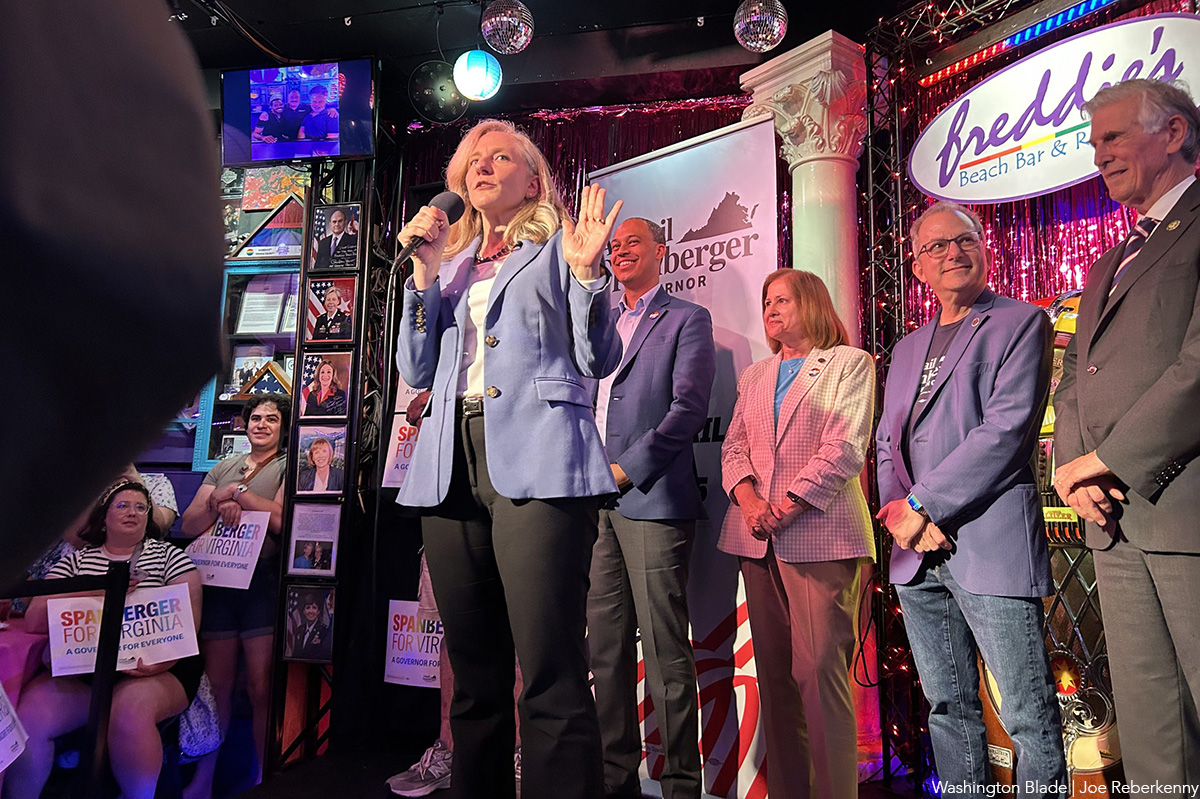
With the general election heating up and LGBTQ rights under increasing threat nationwide, Virginia gubernatorial candidate Abigail Spanberger brought her “Span Virginia Bus Tour” to Arlington’s Freddie’s Beach Bar for a campaign stop filled with cheers, policy pledges, and community spirit.
Spanberger, who served three terms in the U.S. House of Representatives from 2019 through early 2025 for Virginia’s 7th Congressional District, also served as a federal law enforcement officer specializing in narcotics and money laundering cases, and as a CIA case officer working on counterterrorism and nuclear counterproliferation.
Spanberger is running against Republican nominee Winsome Earle-Sears, the current lieutenant governor of Virginia, who said she was “morally opposed” to a bill protecting marriage equality in the commonwealth.
She was joined by other Democratic candidates and supporters: lieutenant gubernatorial candidate Ghazala Hashmi, attorney general candidate Jay Jones, Virginia state Sen. Adam Ebbin (D-Alexandria), and Congressman Don Beyer.
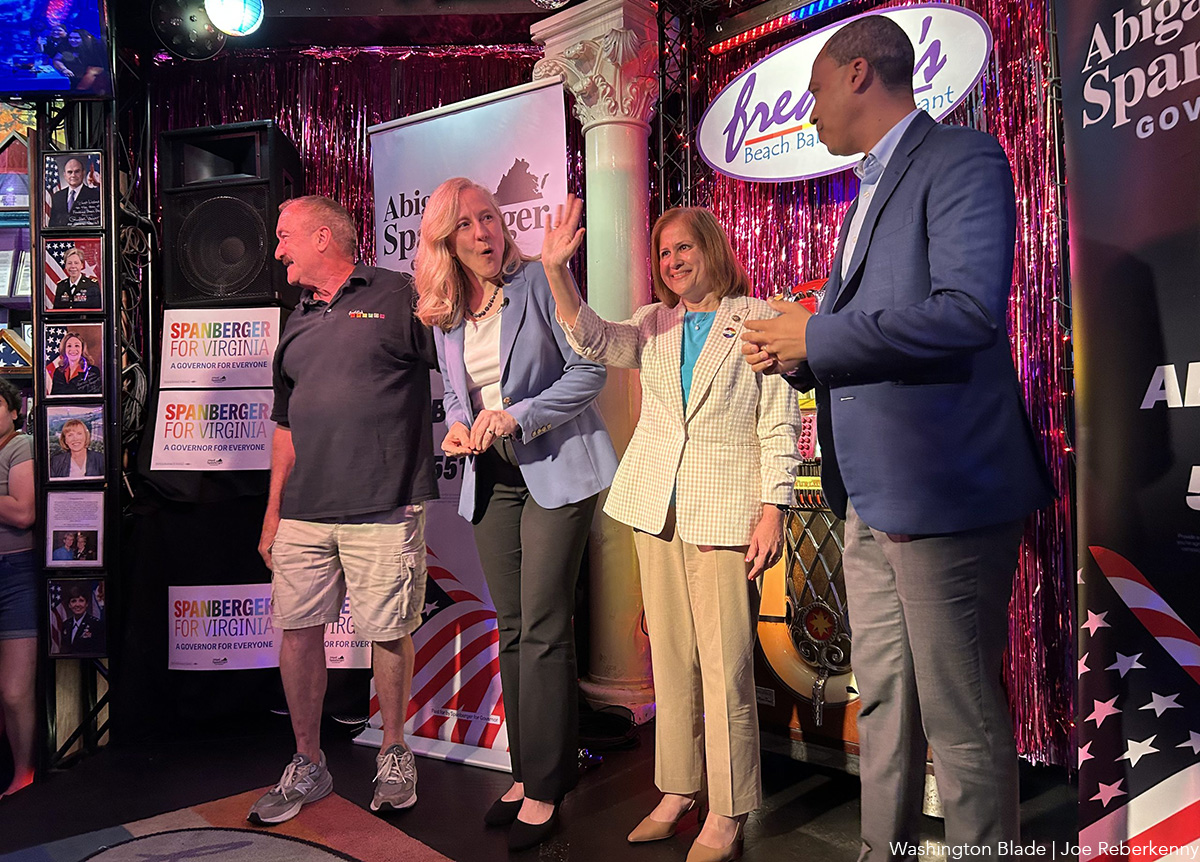
Freddie’s was packed wall-to-wall with supporters, many of whom wore “Spanberger for Virginia” shirts in the progressive Pride flag colors. In her speech, she made it clear that LGBTQ Virginians’ rights are on the ballot this year.
“I’m so excited to be here, and I am so grateful to the entire staff of Freddy’s for letting us overtake this incredible venue that is not just an awesome place to come together in community, but is a symbol to so many people of joy, of happiness, of community and of celebrating our friends and our neighbors,” Spanberger told the packed restaurant. “It is exciting to be here, and particularly during this Pride month, and particularly as we reflect on the 10-year anniversary of Obergefell and the reality that we still have so much work to do.”
“The reality is there are so many people who still would be inclined to take us backwards,” she said. “In this moment when we see attacks on people’s rights, on people’s humanity, on Virginia, on our economy, on research, on public education, on food security, on health care, on Virginians, on their jobs, on public service and on people — it can get heavy.”
“What it does for me is it makes me want to double down, because once upon a time, when I was talking to my mother about some horror show or sequence of activities coming out of a particular administration, she did not really have the patience to listen to me and said ‘Abigail, let your rage fuel you’ — and the conversation was over. And so I reflect on that, because, in fact, every day there is so much fuel to be had in this world and in this moment.”
One of the points Spanberger continued to emphasize was the importance of steadfast state government officials following the election of President Donald Trump, which has led to rollbacks of LGBTQ and bodily autonomy rights as a result of the conservative-majority U.S. Supreme Court.
“What the past few years have shown us is that a Supreme Court decision, no matter how many years we have celebrated its existence, does not protect us in the long term. And so as governor, I will work to make sure that every protection we can put in place for the dignity, the value, and the equal rights of all Virginians is a priority.”
During her speech, Spanberger highlighted several of the key values driving her campaign — protecting reproductive freedom and human rights, lowering healthcare costs, safeguarding Virginia’s environment, and ensuring that public education is affordable, accessible, and rooted in truth, not politics.
Spanberger went as far as to say that she wants to amend the state’s constitution to remove Section 15-A. “The reality is that in Virginia, we still have a ban in our state constitution on marriage equality. It is of the utmost urgency that we move forward with our constitutional amendment.”
“We will work to ensure that that terrible constitutional amendment, that was put in years ago, is taken out and updated and ensuring that Virginia is reflective in our most essential documents of who we are as a commonwealth, which is an accepting place that celebrates the vibrancy of every single person and recognizes that all Virginians have a place, both in that constitution and in law,” she added.
Following the event, two supporters spoke to the Washington Blade about why they had come out to support Spanberger.
“I came out because I needed to show support for this ticket, because it has been a particularly rough week, but a long few years for our rights in this country, in this state, with this governor, and it’s — we need to flip it around, because queer people need protection,” said Samantha Perez, who lives in Ballston. “Trans people need protection. Trans kids need protection. And it’s not gonna happen with who’s in Richmond right now, and we just need to get it turned around.”
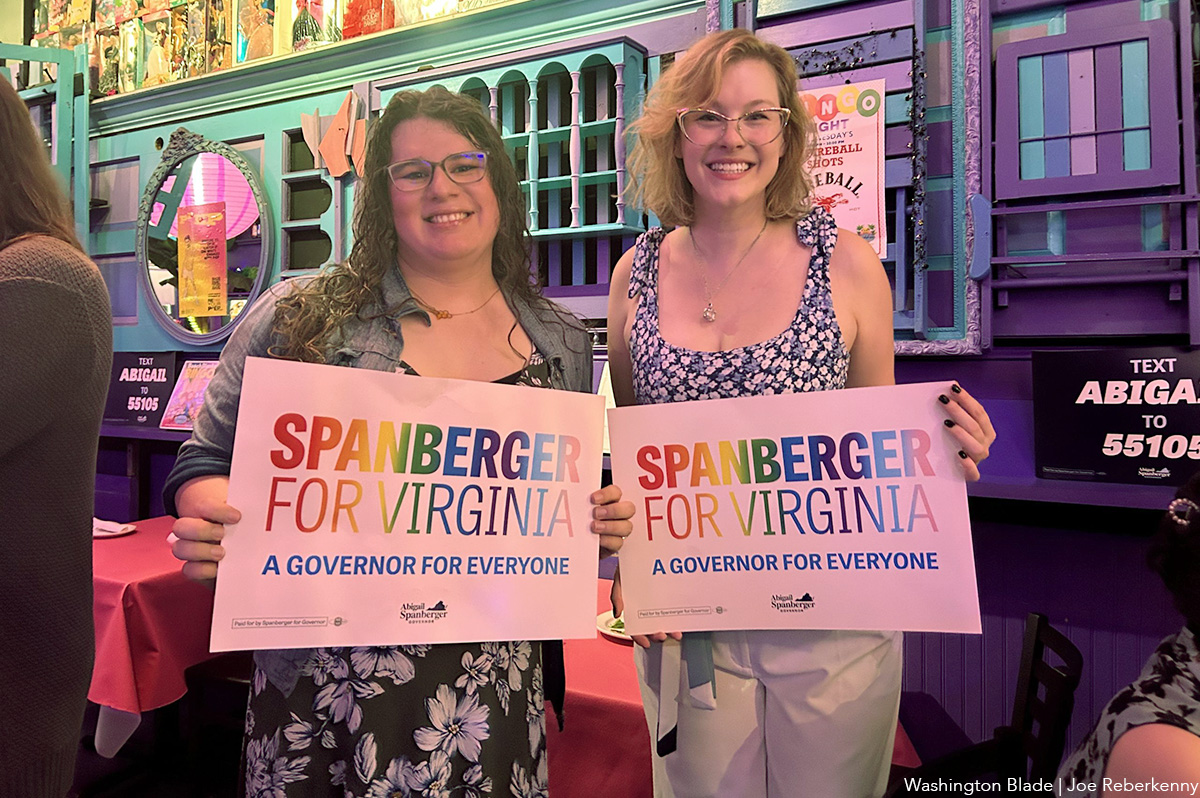
“The whole neighborhood’s here. All our friends are here,” said Annie Styles of Pentagon City. “It means the world to me to take care of each other. That’s what a good community does. That’s not what we’ve had with the Republicans here or across the nation for a really long time. It’s time to show that care. It’s time to make sure that good people are in a position to do good things.”
-

 U.S. Supreme Court4 days ago
U.S. Supreme Court4 days agoSupreme Court upholds ACA rule that makes PrEP, other preventative care free
-

 U.S. Supreme Court4 days ago
U.S. Supreme Court4 days agoSupreme Court rules parents must have option to opt children out of LGBTQ-specific lessons
-

 Congress5 days ago
Congress5 days agoSenate parliamentarian orders removal of gender-affirming care ban from GOP reconciliation bill
-

 District of Columbia5 days ago
District of Columbia5 days agoMan sentenced to 15 years in prison for drug deal that killed two DC gay men

